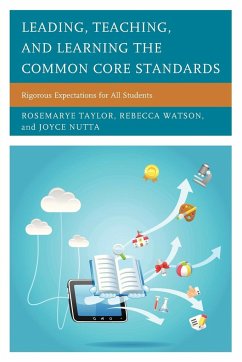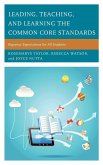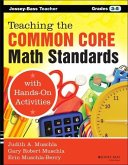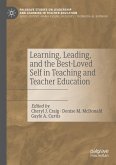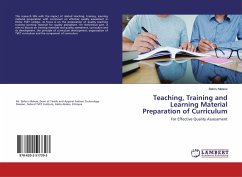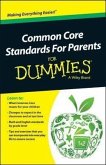Rosemarye T. Taylor, Rebecca Watson, Joyce Nutta
Leading, Teaching, and Learning the Common Core Standards
Rigorous Expectations for All Students
Rosemarye T. Taylor, Rebecca Watson, Joyce Nutta
Leading, Teaching, and Learning the Common Core Standards
Rigorous Expectations for All Students
- Broschiertes Buch
- Merkliste
- Auf die Merkliste
- Bewerten Bewerten
- Teilen
- Produkt teilen
- Produkterinnerung
- Produkterinnerung
Leading, Teaching, and Learning is a resource for teachers taking action on Common Core State Standards to enhance student learning. Each chapter addresses various disciplines and grade levels with concrete examples. Chapters focus on research-based instruction, academic language development, thinking and complexity, English learners, non-proficient readers, rigor, and collaboration for ongoing professional capacity building.
Andere Kunden interessierten sich auch für
![Leading, Teaching, and Learning the Common Core Standards Leading, Teaching, and Learning the Common Core Standards]() Rosemarye T. TaylorLeading, Teaching, and Learning the Common Core Standards70,99 €
Rosemarye T. TaylorLeading, Teaching, and Learning the Common Core Standards70,99 €![Teaching the Common Core Math Standards with Hands-On Activities, Grades 3-5 Teaching the Common Core Math Standards with Hands-On Activities, Grades 3-5]() Judith A. MuschlaTeaching the Common Core Math Standards with Hands-On Activities, Grades 3-529,99 €
Judith A. MuschlaTeaching the Common Core Math Standards with Hands-On Activities, Grades 3-529,99 €![The Apple Shouldn't Fall Far from Common Core The Apple Shouldn't Fall Far from Common Core]() The Apple Shouldn't Fall Far from Common Core94,99 €
The Apple Shouldn't Fall Far from Common Core94,99 €![The Apple Shouldn't Fall Far from Common Core The Apple Shouldn't Fall Far from Common Core]() The Apple Shouldn't Fall Far from Common Core51,99 €
The Apple Shouldn't Fall Far from Common Core51,99 €![Learning, Leading, and the Best-Loved Self in Teaching and Teacher Education Learning, Leading, and the Best-Loved Self in Teaching and Teacher Education]() Learning, Leading, and the Best-Loved Self in Teaching and Teacher Education117,99 €
Learning, Leading, and the Best-Loved Self in Teaching and Teacher Education117,99 €![Teaching, Training and Learning Material Preparation of Curriculum Teaching, Training and Learning Material Preparation of Curriculum]() Bahiru MeleseTeaching, Training and Learning Material Preparation of Curriculum29,99 €
Bahiru MeleseTeaching, Training and Learning Material Preparation of Curriculum29,99 €![Common Core Standards For Parents For Dummies Common Core Standards For Parents For Dummies]() Jared MyracleCommon Core Standards For Parents For Dummies10,99 €
Jared MyracleCommon Core Standards For Parents For Dummies10,99 €-
-
-
Leading, Teaching, and Learning is a resource for teachers taking action on Common Core State Standards to enhance student learning. Each chapter addresses various disciplines and grade levels with concrete examples. Chapters focus on research-based instruction, academic language development, thinking and complexity, English learners, non-proficient readers, rigor, and collaboration for ongoing professional capacity building.
Hinweis: Dieser Artikel kann nur an eine deutsche Lieferadresse ausgeliefert werden.
Hinweis: Dieser Artikel kann nur an eine deutsche Lieferadresse ausgeliefert werden.
Produktdetails
- Produktdetails
- Verlag: Rowman & Littlefield Publishers
- Seitenzahl: 132
- Erscheinungstermin: 10. Juli 2014
- Englisch
- Abmessung: 229mm x 152mm x 7mm
- Gewicht: 203g
- ISBN-13: 9781475810288
- ISBN-10: 1475810288
- Artikelnr.: 40581291
- Herstellerkennzeichnung
- Books on Demand GmbH
- In de Tarpen 42
- 22848 Norderstedt
- info@bod.de
- 040 53433511
- Verlag: Rowman & Littlefield Publishers
- Seitenzahl: 132
- Erscheinungstermin: 10. Juli 2014
- Englisch
- Abmessung: 229mm x 152mm x 7mm
- Gewicht: 203g
- ISBN-13: 9781475810288
- ISBN-10: 1475810288
- Artikelnr.: 40581291
- Herstellerkennzeichnung
- Books on Demand GmbH
- In de Tarpen 42
- 22848 Norderstedt
- info@bod.de
- 040 53433511
Rosemarye Taylor is professor of educational Leadership at the University of Central Florida in Orlando, and has published six books and numerous articles on improving school leadership. Rebecca Watson is senior manager of instructional development with Orange County Public Schools in Orlando. She focuses on school improvement through induction, professional learning communities, and instructional leadership. Joyce Nutta is associate professor of English for speakers of other languages education at the University of Central Florida. She is co-editor of The Tapestry Journal: An International Multidisciplinary Journal on English Language Learner Education, and she recently published Preparing Every Teacher to Reach English Learners: A Practical Guide for Teacher Educators with Harvard Education Press.
List of Figures Preface Acknowledgments Chapter 1 Introduction Development
of Common Core State Standards Assessing Proficiency Embrace CCSS for
Students' Success Organization of Leading, Teaching, Learning CCSS
Practical Steps for Leaders Practical Steps for Teachers Useful Academic
Language Chapter 2 Effective Research Based Instruction Scaffold
Instruction Lesson Introduction Guided Practice Independent Practice
Assessment Sample Science Instructional Plan Engagement Teacher Led Small
Group Instruction Checking for Understanding Feedback to Improve Learning
Practical Steps for Leaders Practical Steps for Teachers Useful Academic
Language Chapter 3 Academic Language General Academic Language Discipline
Specific Academic Language Research Based Vocabulary Instruction Vocabulary
Instruction Protocol Instructional Strategies Expected Language Acquisition
Outcomes Practical Steps for Leaders Practical Steps for Teachers Useful
Academic Language Chapter 4 Rigor-Levels of Thinking, Cognitive Complexity,
and Text Complexity Making Sense of Levels of Thinking and Cognitive
Complexity Levels of Thinking Cognitive Complexity: Depth of Knowledge
(DOK) Text Complexity Misconceptions Effective Use of Text Complexity Close
Reading Motivating Students Student Academic Goals Writing is Thinking
Practical Steps for Leaders Practical Steps for Teachers Useful Academic
Language Chapter 5 English Learners and CCSS Something More Levels of
English Proficiency WIDA Language Proficiency Levels Beginning English
Learners Beyond Beginning English Learners Support for Intermediate and
Advanced English Learners Cultural Considerations Learning Scales and
English Learners Practical Steps for Leaders Practical Steps for Teachers
Useful Academic Language Chapter 6 Under-resourced Students School Factors
that Leaders Control Rewards and Sanctions Academic Resources Classroom
Factors that Teachers Control Collaboration Project Based Learning Research
Resilience Responsibilities of Teachers and Leaders Practical Steps for
Leaders Practical Steps for Teachers Useful Academic Language Chapter 7
Clear Goals for Student Self-monitoring and Teacher Feedback Clear Goals,
Self Monitoring, and Feedback Benchmark Scales with Evidence Student
Friendly Scales Implementation of Student Self Monitoring and Teacher's
Feedback Instructional Differentiation Exceptional Student Education
English Learners Making Learning Accessible Practical Steps for Leaders
Practical Steps for Teachers Useful Academic Language Chapter 8 -
Collaboration to Empower Teachers for Success on CCSS Characteristics of
Collaboration Collaboration is Voluntary Parity Among Participants Mutual
Goals Responsibility Sharing Resources Shared Accountability Improving
Student Learning Outcomes Collaboration on Mini-assessments and Data
Analysis Professional Learning for Transfer to Practice Book Studies Action
Research Data Study Massive Open Online Courses (MOOCs) Lesson Study
Research Teams Leadership for Effective Collaboration Leading, Teaching,
and Coaching to Improve Student Learning Outcomes Practical Steps for
Leaders Practical Steps for Teachers Useful Academic Language Additional
Resources References Author Information Index
of Common Core State Standards Assessing Proficiency Embrace CCSS for
Students' Success Organization of Leading, Teaching, Learning CCSS
Practical Steps for Leaders Practical Steps for Teachers Useful Academic
Language Chapter 2 Effective Research Based Instruction Scaffold
Instruction Lesson Introduction Guided Practice Independent Practice
Assessment Sample Science Instructional Plan Engagement Teacher Led Small
Group Instruction Checking for Understanding Feedback to Improve Learning
Practical Steps for Leaders Practical Steps for Teachers Useful Academic
Language Chapter 3 Academic Language General Academic Language Discipline
Specific Academic Language Research Based Vocabulary Instruction Vocabulary
Instruction Protocol Instructional Strategies Expected Language Acquisition
Outcomes Practical Steps for Leaders Practical Steps for Teachers Useful
Academic Language Chapter 4 Rigor-Levels of Thinking, Cognitive Complexity,
and Text Complexity Making Sense of Levels of Thinking and Cognitive
Complexity Levels of Thinking Cognitive Complexity: Depth of Knowledge
(DOK) Text Complexity Misconceptions Effective Use of Text Complexity Close
Reading Motivating Students Student Academic Goals Writing is Thinking
Practical Steps for Leaders Practical Steps for Teachers Useful Academic
Language Chapter 5 English Learners and CCSS Something More Levels of
English Proficiency WIDA Language Proficiency Levels Beginning English
Learners Beyond Beginning English Learners Support for Intermediate and
Advanced English Learners Cultural Considerations Learning Scales and
English Learners Practical Steps for Leaders Practical Steps for Teachers
Useful Academic Language Chapter 6 Under-resourced Students School Factors
that Leaders Control Rewards and Sanctions Academic Resources Classroom
Factors that Teachers Control Collaboration Project Based Learning Research
Resilience Responsibilities of Teachers and Leaders Practical Steps for
Leaders Practical Steps for Teachers Useful Academic Language Chapter 7
Clear Goals for Student Self-monitoring and Teacher Feedback Clear Goals,
Self Monitoring, and Feedback Benchmark Scales with Evidence Student
Friendly Scales Implementation of Student Self Monitoring and Teacher's
Feedback Instructional Differentiation Exceptional Student Education
English Learners Making Learning Accessible Practical Steps for Leaders
Practical Steps for Teachers Useful Academic Language Chapter 8 -
Collaboration to Empower Teachers for Success on CCSS Characteristics of
Collaboration Collaboration is Voluntary Parity Among Participants Mutual
Goals Responsibility Sharing Resources Shared Accountability Improving
Student Learning Outcomes Collaboration on Mini-assessments and Data
Analysis Professional Learning for Transfer to Practice Book Studies Action
Research Data Study Massive Open Online Courses (MOOCs) Lesson Study
Research Teams Leadership for Effective Collaboration Leading, Teaching,
and Coaching to Improve Student Learning Outcomes Practical Steps for
Leaders Practical Steps for Teachers Useful Academic Language Additional
Resources References Author Information Index
List of Figures Preface Acknowledgments Chapter 1 Introduction Development
of Common Core State Standards Assessing Proficiency Embrace CCSS for
Students' Success Organization of Leading, Teaching, Learning CCSS
Practical Steps for Leaders Practical Steps for Teachers Useful Academic
Language Chapter 2 Effective Research Based Instruction Scaffold
Instruction Lesson Introduction Guided Practice Independent Practice
Assessment Sample Science Instructional Plan Engagement Teacher Led Small
Group Instruction Checking for Understanding Feedback to Improve Learning
Practical Steps for Leaders Practical Steps for Teachers Useful Academic
Language Chapter 3 Academic Language General Academic Language Discipline
Specific Academic Language Research Based Vocabulary Instruction Vocabulary
Instruction Protocol Instructional Strategies Expected Language Acquisition
Outcomes Practical Steps for Leaders Practical Steps for Teachers Useful
Academic Language Chapter 4 Rigor-Levels of Thinking, Cognitive Complexity,
and Text Complexity Making Sense of Levels of Thinking and Cognitive
Complexity Levels of Thinking Cognitive Complexity: Depth of Knowledge
(DOK) Text Complexity Misconceptions Effective Use of Text Complexity Close
Reading Motivating Students Student Academic Goals Writing is Thinking
Practical Steps for Leaders Practical Steps for Teachers Useful Academic
Language Chapter 5 English Learners and CCSS Something More Levels of
English Proficiency WIDA Language Proficiency Levels Beginning English
Learners Beyond Beginning English Learners Support for Intermediate and
Advanced English Learners Cultural Considerations Learning Scales and
English Learners Practical Steps for Leaders Practical Steps for Teachers
Useful Academic Language Chapter 6 Under-resourced Students School Factors
that Leaders Control Rewards and Sanctions Academic Resources Classroom
Factors that Teachers Control Collaboration Project Based Learning Research
Resilience Responsibilities of Teachers and Leaders Practical Steps for
Leaders Practical Steps for Teachers Useful Academic Language Chapter 7
Clear Goals for Student Self-monitoring and Teacher Feedback Clear Goals,
Self Monitoring, and Feedback Benchmark Scales with Evidence Student
Friendly Scales Implementation of Student Self Monitoring and Teacher's
Feedback Instructional Differentiation Exceptional Student Education
English Learners Making Learning Accessible Practical Steps for Leaders
Practical Steps for Teachers Useful Academic Language Chapter 8 -
Collaboration to Empower Teachers for Success on CCSS Characteristics of
Collaboration Collaboration is Voluntary Parity Among Participants Mutual
Goals Responsibility Sharing Resources Shared Accountability Improving
Student Learning Outcomes Collaboration on Mini-assessments and Data
Analysis Professional Learning for Transfer to Practice Book Studies Action
Research Data Study Massive Open Online Courses (MOOCs) Lesson Study
Research Teams Leadership for Effective Collaboration Leading, Teaching,
and Coaching to Improve Student Learning Outcomes Practical Steps for
Leaders Practical Steps for Teachers Useful Academic Language Additional
Resources References Author Information Index
of Common Core State Standards Assessing Proficiency Embrace CCSS for
Students' Success Organization of Leading, Teaching, Learning CCSS
Practical Steps for Leaders Practical Steps for Teachers Useful Academic
Language Chapter 2 Effective Research Based Instruction Scaffold
Instruction Lesson Introduction Guided Practice Independent Practice
Assessment Sample Science Instructional Plan Engagement Teacher Led Small
Group Instruction Checking for Understanding Feedback to Improve Learning
Practical Steps for Leaders Practical Steps for Teachers Useful Academic
Language Chapter 3 Academic Language General Academic Language Discipline
Specific Academic Language Research Based Vocabulary Instruction Vocabulary
Instruction Protocol Instructional Strategies Expected Language Acquisition
Outcomes Practical Steps for Leaders Practical Steps for Teachers Useful
Academic Language Chapter 4 Rigor-Levels of Thinking, Cognitive Complexity,
and Text Complexity Making Sense of Levels of Thinking and Cognitive
Complexity Levels of Thinking Cognitive Complexity: Depth of Knowledge
(DOK) Text Complexity Misconceptions Effective Use of Text Complexity Close
Reading Motivating Students Student Academic Goals Writing is Thinking
Practical Steps for Leaders Practical Steps for Teachers Useful Academic
Language Chapter 5 English Learners and CCSS Something More Levels of
English Proficiency WIDA Language Proficiency Levels Beginning English
Learners Beyond Beginning English Learners Support for Intermediate and
Advanced English Learners Cultural Considerations Learning Scales and
English Learners Practical Steps for Leaders Practical Steps for Teachers
Useful Academic Language Chapter 6 Under-resourced Students School Factors
that Leaders Control Rewards and Sanctions Academic Resources Classroom
Factors that Teachers Control Collaboration Project Based Learning Research
Resilience Responsibilities of Teachers and Leaders Practical Steps for
Leaders Practical Steps for Teachers Useful Academic Language Chapter 7
Clear Goals for Student Self-monitoring and Teacher Feedback Clear Goals,
Self Monitoring, and Feedback Benchmark Scales with Evidence Student
Friendly Scales Implementation of Student Self Monitoring and Teacher's
Feedback Instructional Differentiation Exceptional Student Education
English Learners Making Learning Accessible Practical Steps for Leaders
Practical Steps for Teachers Useful Academic Language Chapter 8 -
Collaboration to Empower Teachers for Success on CCSS Characteristics of
Collaboration Collaboration is Voluntary Parity Among Participants Mutual
Goals Responsibility Sharing Resources Shared Accountability Improving
Student Learning Outcomes Collaboration on Mini-assessments and Data
Analysis Professional Learning for Transfer to Practice Book Studies Action
Research Data Study Massive Open Online Courses (MOOCs) Lesson Study
Research Teams Leadership for Effective Collaboration Leading, Teaching,
and Coaching to Improve Student Learning Outcomes Practical Steps for
Leaders Practical Steps for Teachers Useful Academic Language Additional
Resources References Author Information Index

